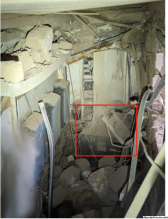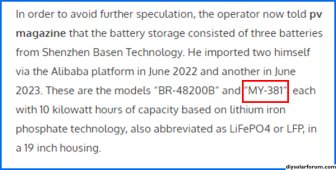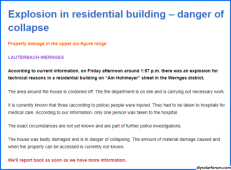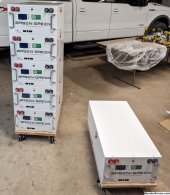Basen techonology
New Member
- Joined
- Jul 20, 2020
- Messages
- 1
Honourable parties,
Greetings!
On behalf of Basen Technology,I wish to address a recent article published by PV Magazine with the headline"The cause of the explosion of the 30KWH battery storage system will probably remain unclear" that mentioned Basen two pieces 48V-200B battery pack. We take the safety and quality of our products with utmost seriousness, in the first place,we are actively engaging with the customer involved in the incident and seek to clarify the following points to our partners in the photovoltaic industry through this notice:
Non-Battery Explosion:
Despite PV Magazine reporting a battery explosion,observation of the scene through photographs indicates that all three battery backs and the inverter were undamaged and in good condition,with no explosion occurring.
Greetings!
On behalf of Basen Technology,I wish to address a recent article published by PV Magazine with the headline"The cause of the explosion of the 30KWH battery storage system will probably remain unclear" that mentioned Basen two pieces 48V-200B battery pack. We take the safety and quality of our products with utmost seriousness, in the first place,we are actively engaging with the customer involved in the incident and seek to clarify the following points to our partners in the photovoltaic industry through this notice:
Non-Battery Explosion:
Despite PV Magazine reporting a battery explosion,observation of the scene through photographs indicates that all three battery backs and the inverter were undamaged and in good condition,with no explosion occurring.
 ( Image 1 from PV magazine)
( Image 1 from PV magazine)Not All Batteries from Basen:
The MY-381 product mentioned in the report does not belong to Basen.This has been confirmed through email with the customer

( Image 2 from PV magazine)
Official Announcement from the German Fire Department:
Neither the fire department nor the customer has explicitly stated that the collapse of the building was caused by a battery explosion

( Image 3 from vogelsberger-zeitung)
Analysis of the photographs from the scene shows that the battery structure appears to be intact,and it remains unclear whether there was a leakage of electrolyte.Technically speaking,leakage of electrolyte or gas on its own would not lead to the combustion of other substances.It is only in the event of an internal short circuit within the battery cell,where sparks could lead to thermal runaway and subsequently cause combustion or explosion.The change in air pressure and the force of heavy objects due to the collapse of the building might have forced the battery to breach their pressure relief valves,which could explain the“lithium smell”described by the customer.
We sincerely thank all the professionals for your attention and understanding regarding this incident and look forward to the official investigation.Our team is currently in communication with PV Magazine to clarify the facts too.
Thank you again for your attention and support.
Warm regards
The MY-381 product mentioned in the report does not belong to Basen.This has been confirmed through email with the customer

( Image 2 from PV magazine)
Official Announcement from the German Fire Department:
Neither the fire department nor the customer has explicitly stated that the collapse of the building was caused by a battery explosion

( Image 3 from vogelsberger-zeitung)
Analysis of the photographs from the scene shows that the battery structure appears to be intact,and it remains unclear whether there was a leakage of electrolyte.Technically speaking,leakage of electrolyte or gas on its own would not lead to the combustion of other substances.It is only in the event of an internal short circuit within the battery cell,where sparks could lead to thermal runaway and subsequently cause combustion or explosion.The change in air pressure and the force of heavy objects due to the collapse of the building might have forced the battery to breach their pressure relief valves,which could explain the“lithium smell”described by the customer.
We sincerely thank all the professionals for your attention and understanding regarding this incident and look forward to the official investigation.Our team is currently in communication with PV Magazine to clarify the facts too.
Thank you again for your attention and support.
Warm regards



